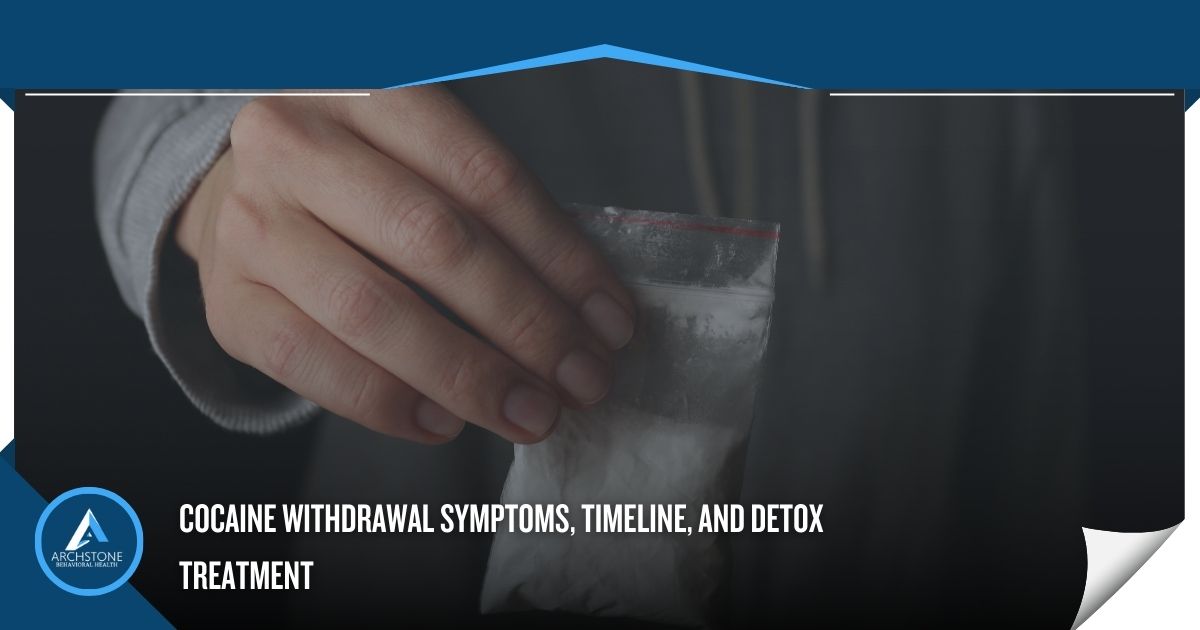Cocaine Withdrawal Symptoms, Timeline, and Detox Treatment
Get Help Now
Cocaine abuse can quickly spiral into a life-threatening addiction. Living with untreated cocaine use disorder can lead to serious, long-term health complications. Some of these complications may be life-threatening.
It’s essential to seek treatment to address the complex underlying causes of cocaine addiction. Many people begin the addiction recovery process in a detox program. During detox, medical and mental health professionals provide support and treatments to help people manage withdrawal symptoms.
This article will explore what to expect during cocaine withdrawal. You will learn what withdrawal symptoms to expect during the cocaine withdrawal timeline. You will also discover what detox treatment is available to help you manage the symptoms of withdrawal.
Contact the Archstone Behavioral Health specialists now to learn about our comprehensive treatment programs. Our intake staff will answer your questions, verify your insurance details, and schedule an evaluation as quickly as possible. Reach out today to get started toward a healthier future.
Cocaine Addiction: An Overview
Cocaine is a potent, illegal stimulant drug. It is a product of a South American coca plant. People use cocaine for its stimulant effects.
The short-term effects of cocaine include:
- Increased energy
- Mood changes
- Euphoria
- Heightened senses
People use cocaine by snorting, injecting, or smoking it. Dealers may mix cocaine with baking soda and other chemicals to produce crack cocaine. Crack cocaine is a solid form of cocaine.
People may enjoy the effects of cocaine. They may abuse cocaine more often. Repeated or heavy cocaine abuse can lead to a physical and mental addiction to the drug.
Once someone develops a physical addiction to cocaine, it can be nearly impossible to stop using it without receiving treatment and support. Many people experience uncomfortable or dangerous withdrawal symptoms if they stop using it.
Professional treatment can help people manage the effects of cocaine withdrawal to have a safe, complete detox.
What are Common Cocaine Withdrawal Symptoms?
People who develop a physical dependence on cocaine may experience emotional and physical symptoms when they stop taking it. Symptoms often develop soon after a person stops using cocaine and can last for days or weeks.
Common cocaine withdrawal symptoms include:
- Increased appetite and weight gain
- Poor concentration
- Changes in sleep patterns–often sleeping too much
- Paranoia
- Slowed movement and thinking
- Mood swings or irritability
- Muscle aches
- Tremors
- Chills
- Fatigue
- Depression
- Inability to experience pleasure
- Nightmares
- Strong cravings for cocaine
Some people develop depression and suicidal thoughts during cocaine withdrawal. Supervision and treatment are critical during cocaine withdrawal to reduce the risk of self-harm.
The severity and length of a person’s withdrawal symptoms depends on several factors, including:
- How long they used cocaine
- The amount of cocaine they used
- Their overall physical health
- Co-occurring mental health conditions
- Their environment
If you or someone in your life struggles with cocaine abuse, you must seek detox and substance use disorder (SUD) treatment as soon as possible.
How Long Does Cocaine Withdrawal Last?
Each person has their own cocaine withdrawal timeline, but symptoms typically follow a pattern. Here is an overview of what to expect during each stage of cocaine withdrawal.
Stage 1: The first 90 minutes
You may begin to experience withdrawal symptoms within just 90 minutes of your last dose of cocaine. Your symptoms may include:
- Poor concentration
- Fatigue
- Depression
- Anxiety
You may feel the urge to use cocaine again to relieve these symptoms.
Stage 2: 7-10 days
Your withdrawal symptoms may get worse over the next week to ten days. Many people experience uncomfortable symptoms, including:
- Nerve pain
- Muscle aches
- Chills
- Nightmares
- Increased appetite
Many people also struggle with intense cravings for cocaine during this stage.
Stage 3: 10 days to 10 weeks
After about ten days, your withdrawal symptoms may begin to improve. You may experience fewer physical and emotional symptoms. However, you may still have intense cravings.
Your cravings may appear without warning or occur after experiencing a trigger. You will require ongoing treatment and support to avoid relapse and stay focused on your recovery.
What Happens in a Cocaine Detox Program?
People recovering from cocaine addiction require comprehensive, compassionate treatment and ongoing support. Addiction treatment typically begins in a medically-supported detox program.
During detox, medical professionals and mental health specialists develop individualized treatment programs to keep each person safe and comfortable throughout the detox process.
A cocaine detox program includes:
- Medications to reduce physical and emotional discomfort
- Mental health support, including counseling and support groups
- Behavioral therapies, including cognitive behavioral therapy (CBT)
- Mindfulness, exercise, nutrition support, and other holistic therapies
- 24/7 supervision and access to treatment
People who participate in a medically-supported detox program are more likely to complete the detox process. A complete detox can set you up for long-term recovery success.
Find Help Now
If you or someone you love lives with cocaine addiction, you are not alone. Contact the Archstone Behavioral Health staff now to learn about our substance abuse treatment programs or to schedule an appointment with our specialists.
